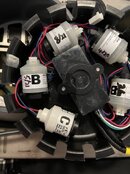Heat Miser
Contributor
I have found the rEvo B cells (manufactured by Vadagraph from what I understand) to be rock solid, to get the rEvo B label the cells are tested for performance by rEvo. I have never had a cell fail in 18 months before it is rotated off the controller, I have never had a cell fail after 24 months (cell position 4). I have had one cell fail after around month 27 (cell position 5) and 2 fail in month 29 (cell position 5), the cells that failed at 29 months I disconnect and dived with 1 cell on the dream until it was time to add the new cell a month later, the cell that failed at 27 months I replaced with a cell that was cycled out earlier that I found to be still functioning well.
What is the differnce between B's and C's (are there A's) I got this C from Belgium last year when things were in short suppply





